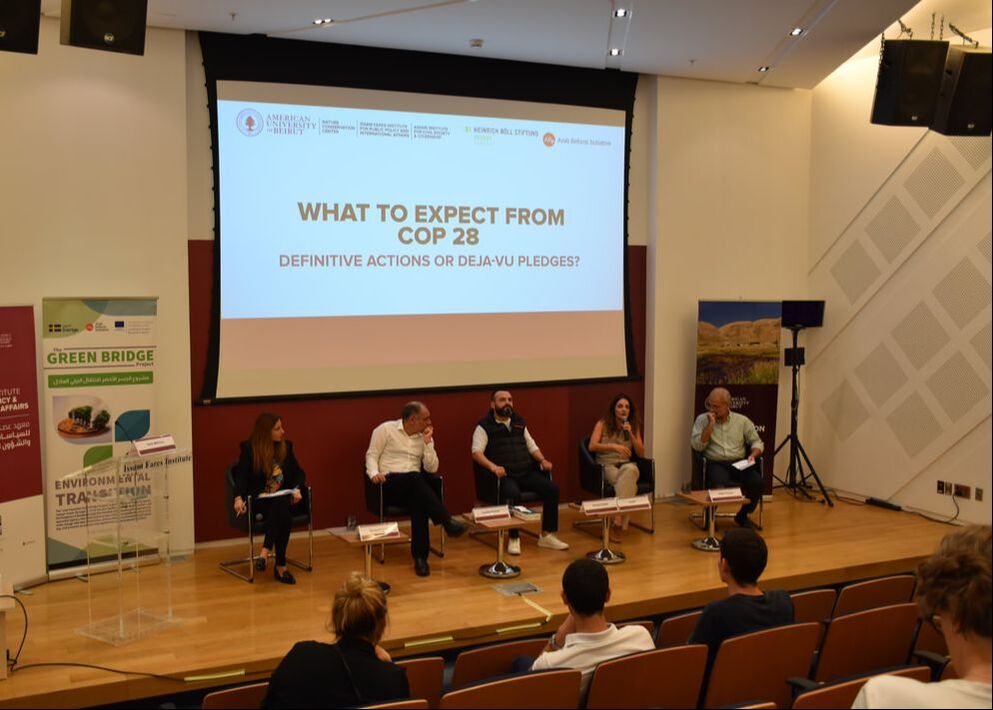|
The American University of Beirut’s Nature Conservation Center (AUB-NCC) and the Arab Reform Initiative (ARI), in collaboration with IFI, held a panel discussion titled “What to Expect from COP 28 - Definitive Actions or Deja-Vu Pledges?” on October 24. The event's main focus was on the upcoming COP 28 summit and the crucial issues pertaining to the worldwide effort to combat climate change. Moderated by Director of the Environmental Politics Program at ARI, Sarine Karajerian, speakers included UNEP’s Regional Coordinator for Climate Action Dr. Tarek Alkhoury, Climate Activist and MENA Operations Coordinator at Leave it in the Ground Georges Ziadeh, UNDP’s Climate Change Projects Manager Lea Kai, IFI’s Policy Advisor and Associate Fellow Camille Ammoun, and IFI’s Climate Change and Environment Program Director Dr. Nadim Farajalla. To start with, Alkhoury emphasized the seriousness of climate change as a worldwide concern. He underlined that although global emissions from Lebanon are relatively low, the country is nonetheless very vulnerable to the negative consequences of climate change. He further emphasized the vital significance of climate finance and mentioned that the COP 28 presidency is devoted to tackling climate change adaptation and financing, with significant advancements anticipated in this area. Karajerian spoke on the complex relationship between climate change and war. She emphasized that climate change needs to be taken into account in Lebanon's recovery strategy, pointing out that the country is at serious risk of desertification. She noted the need for quick action and expressed worry about how climate change may reduce Lebanon's GDP.
Meanwhile, Ammoun addressed the GCC’s recognition of the need to change to a low carbon, sustainable society. GCC member countries are actively adjusting to new energy sources, as the market for fossil fuels contracts. He pointed out that Saudi Arabia is assiduously pursuing the same objective, while UAE has an active nuclear energy plant that does not fit the GCC sustainability plan. Ammoun also questioned whether the UAE's participation at COP 28 was intended to have an impact on the agenda of the meeting. Kai underlined the importance of the Lebanese delegation's attendance at COP 28, being the biggest to date, including representatives from parliament, think tanks, youth and women's organizations, NGOs, and ministries among others. Remarkably, 39% of the delegation consists of women, and 34% are young people, she said. At the same time, Farajalla voiced hope on upcoming COP results, tempered with a hint of gloom. He mentioned complex issues such as the USD 405 billion fund that the US asked for the war in Israel and Ukraine, and clarified that politics plays a pivotal role in COP finances. Farajalla advocated for incorporating geoengineering into the mitigation of climate change and making nations responsible for their climate commitments. Georges Ziadeh addressed the function of civil society organizations in climate talks. He said that youth organizations had gained more clout over the last two years and recognized the "Loss and Damage" initiative as a modest success. Ziadeh mentioned that because of competing objectives and crises, COP decisions are sometimes only partially carried out. He discussed how wealthy nations' private actions affect the entire world and highlighted how the Arab world is changing, giving hope for regional advancement. You can watch the full recording of the discussion here. Comments are closed.
|
Archives
July 2024
|

